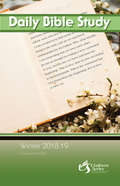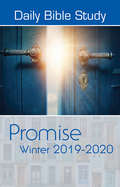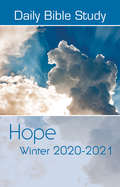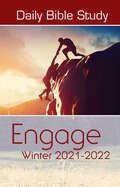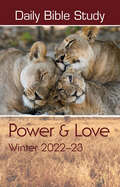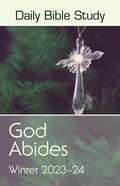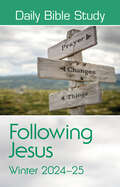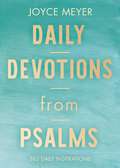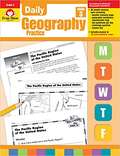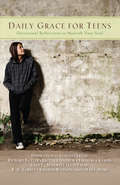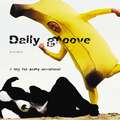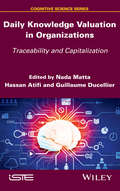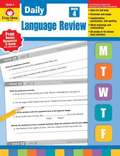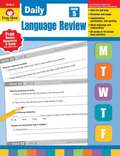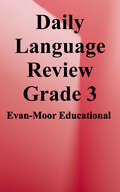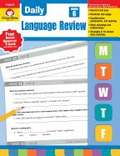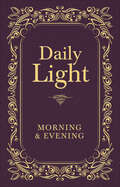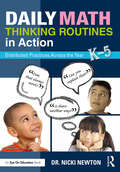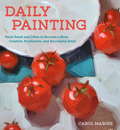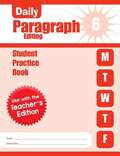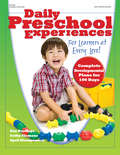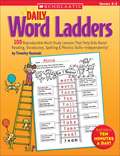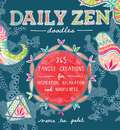- Table View
- List View
Daily Bible Study Winter 2018-2019: Our Love of God
by Clara K. Welch Martha Myre Randy CrossWinter Theme: Our Love for God Deuteronomy | Joshua | Psalms | Matthew | Philippians | James This winter, Daily Bible Study presents a series of readings following the theme "Our Love for God." Readings come from Old and New Testament texts. These daily readings, which prepare us for the 13 lessons in Adult Bible Studies, are written by Clara Welch, Randy Cross, and Martha Myre God Commands Our Love, Respect, and Obedience Daily readings in this five-week unit focus on love and devotion, choosing to love and serve God, what it means to love and worship God, Jesus as God's loving promise, and how we can model God's love. Loving God by Trusting Christ This five-week unit features readings that encourage holding fast to God's love, submitting to God in love, submitting to God in Christ, devoting all to Christ, and renouncing everything for Christ. Love Songs That Glorify God The daily readings in this three-week unit lead us to ponder God's steadfast love, praise God's mighty works, and live with God's loving assurance. This ongoing day-by-day Bible study series is presented in quarterly segments. Bible-based, Christ-focused, and United Methodist-approved, this resource helps individuals develop the discipline of studying the Bible every day. It coordinates with the lesson themes of Adult Bible Studies. Each lesson includes: a one-page Bible study for each day of the quarter, along with introductory reflection questions and Commentary on the daily Scripture passage, Life Application, and a concluding prayer. Available in print and eBook format.
Daily Bible Study Winter 2019-2020
by Stan PurdumWinter Theme: Promise Genesis | Hebrews | Isaiah|Matthew | Acts | Ruth | 2 Samuel | Jeremiah | Exodus This winter, Daily Bible Study presents a series of readings supporting the theme "Promise." Readings come from Old and New Testament texts. These daily readings, which prepare us for the 13 lessons in Adult Bible Studies, are written by Stan Purdum, Michelle J. Morris, and Susan Groseclose. Hope Daily readings in this unit center on one of the things "promise" gives us: hope. Underlying and uniting these readings is the expectation that, regardless of what is happening in the present, God has a good future for us. We see how Abraham left his homeland and moved to Canaan, impelled by God's direction and trust that God had something good for him. We recall the hope the servant Isaiah spoke of, one who "will bring justice to the nations" (Isaiah 42:1). The angel's announcement to Joseph that Mary would bear God's Son reminds us that Jesus is the fulfillment of "God with us," clearly an expression of hope. And Jesus' last words to his disciples before ascending into heaven planted in them the hope of the Holy Spirit's coming and the reality of Spirit-filled living. Covenants: The Basis for Committed Relationships Readings in this unit focus on covenants and the promises they include. From God's covenant with Abram to Ruth's covenant with Naomi, God's covenant with David to God's new covenant announced through Jeremiah and extended to us, we are challenged to examine the covenants we make with others and celebrate the covenant God has made with us. Holiness Expressed Readings in this unit call us to live into the promise God gives us to be holy people. Holiness, a primary attribute of God, is also present in the world God has created; these readings invite us to look at holiness in four of the ways in which it is expressed: holy place, holy presence, holy people, and holy purpose. This ongoing day-by-day Bible study series is a great companion to Adult Bible Studies but can also be used as a standalone study for anyone wanting daily time with God. It is presented in quarterly segments. Bible-based, Christ-focused, and United Methodist-approved, this resource helps individuals develop the discipline of studying the Bible every day and coordinates with the lesson themes of Adult Bible Studies. Each lesson includes a one-page Bible study for each day of the quarter, along with introductory reflection questions and commentary on the daily Scripture passage, life application, and a concluding prayer. Now, in response to feedback, we are introducing new features and benefits to the resources including: A comprehensive Bible study plan with more flexibility in terms of Scripture selection and topics. Observation of the church seasons, including Advent and Lent. Visit AdultBibleStudies.com and sign up for the FREE weekly newsletter to automatically receive the FREE Current Events Supplement and other information about these resources and more!
Daily Bible Study Winter 2020-2021
by Sue Mink Michael Whitcomb-Tavey Taylor W. MillsThis ongoing day-by-day Bible study series is presented in quarterly segments. Bible-based, Christ-focused, and United Methodist-approved, this resource helps individuals develop the discipline of studying the Bible every day. It coordinates with the lesson themes of Adult Bible Studies listed on the facing page. Each lesson includes: a one-page Bible study for each day of the quarter, along with introductory reflection questions and Commentary on the daily Scripture passage, Life Application, and a concluding prayer.group studies. Available in regular and large print or as an eBook. Winter theme: TRADITION Sacred Gifts and Holy Gatherings Genesis Exodus Leviticus Numbers Deuteronomy Song of Solomon Isaiah Hosea Micah Matthew Mark Luke John Acts Romans 1 Corinthians Revelation
Daily Bible Study Winter 2021-2022
by Henry G. Brinton Timothy Merrill Barbara DickDaily Bible Study is a great companion to the quarterly Adult Bible Studies or as a stand-alone study. It is presented in quarterly segments. Bible-based, and Christ-focused, it coordinates with the lesson themes of Adult Bible Studies. Each daily reading includes a one-page Bible study for each day of the quarter, along with introductory reflection questions and commentary on the daily Scripture passage, life application, and a concluding prayer. Daily Bible Study Winter 2021-2022 Theme: EngagePerhaps at no other time during the year is the call of our faith more at odds with culture than during Advent. The Christian season that calls us to wait is met with a culture that encourages us to decorate, entertain, buy, spend, and entertain, with calendars booked from season’s beginning to its end. Such ceaseless activity can blind us to the awe and wonder of God’s presence all around us, leaving us spiritually parched, empty, and unable to join in the life and work to which God calls us. These Bible lessons call us to wait and to respond with wonder to the God who came to us in Jesus Christ, thus equipping ourselves to bear witness to our faith. Unit 1: Wait for ItAdvent is a time of anticipation and waiting. This unit invites us to explore waiting as an important element in three episodes in Luke’s telling of the Christmas story. It ends with a reminder that as much as we are called to wait for the Lord, Jesus Christ waits patiently for us.Scriptures: Luke 1:5-25, 57-58; Luke 1:26-38, 57-58; Luke 2:25-38; Revelation 3:20-4:11 Spiritual Practice: Praying without ceasing Unit 2: WonderWe are a busy people rushing from place to place and task to task as the hands of the clock chase each other around the dial. We get caught up in the mundane reality of ordinary life and if we do not stop, we can so easily miss the extraordinary and sublime experience of entering into God’s presence. The lessons in this unit explore various ways human beings have experienced God’s glory. Scriptures: Psalm 19; Isaiah 6:1-13; Mark 9:2-8; Exodus 34:29-35; Revelation 19:1-10 Spiritual Practice: Singing/meditating on hymns of praise Unit 3: Show and TellThe lessons in this unit explore the various ways we can participate with God through our actions. When we read through both the Old and the New Testaments, we see that by engaging in life-giving activities, we join in the work to which God set our hands in the Garden of Eden. God calls us both to show and to tell others of our faith. Scriptures: Deuteronomy 6:4-9, Matthew 22:34-40; Matthew 5:14-16; James 1:19-27; Matthew 28:16-20 Spiritual Practice: Testimony in word and deed Visit AdultBibleStudies.com and sign up for the weekly newsletter to automatically receive the FREE Current Events Supplement and other information about these resources and more!
Daily Bible Study Winter 2022-2023
by Clara K. Welch Michelle J. Morris Timothy MerrillStudy the Bible daily for a closer relationship with God.Daily Bible Study is a great companion to the quarterly Adult Bible Studies or as a stand-alone study for those wanting to study the bible daily. It is presented in quarterly segments. Bible-based and Christ-focused, it coordinates with the lesson themes of Adult Bible Studies. Each daily reading includes a one-page Bible study for each day of the quarter, along with introductory reflection questions and commentary on the daily Scripture passage, life application, and a concluding prayer.Additional information about Daily Bible Study, Winter 2022-2023 Theme: Power and LoveThis winter, Daily Bible Study presents a series of readings supporting the theme “Power and Love.” Readings come from the Old and New Testament texts. These daily readings, which prepare us for the 13 lessons in Adult Bible Studies, are written by Michelle Morris, Tim Merrill, and Clara Welch.Unit 1Power and VulnerabilityGod’s incarnation was into a poor family, from a village of no consequence, vulnerable to the whims and machinations of the mighty Roman Empire. While some readers can relate to this poverty and obscurity, most are citizens of a great world power. Some people know from experience that power can be abused, even against a government’s own citizens, but others have known only the protection and benefits of that power. These readings invite us to hear the Nativity accounts from the vantage point of the victims of empire.Scriptures: Judges 9:1-15; Matthew 1:1-25; Matthew 2:1-12; Matthew 2:13-15Spiritual Practice: Acts of MercyUnit 2Power and BelongingThe readings in this unit follow the trajectory of biblical imagery for faith development from adoption through baptism and infancy in faith, into youthful excitement and exuberance, and then to a mature faith that struggles, challenges, and questions. They move us to examine our faith and encourage us to plant ourselves firmly on the path toward maturity.Scriptures: Galatians 3:23—4:7; Luke 15:11-32; John 17:1-24 and Ephesians 4:14; Colossians 3:12-17; Matthew 22:1-14Spiritual Practice: Rule of LifeUnit 3The Power of LoveOne of the distinct traits of biblical theology is the emphasis on God’s hesed (lovingkindness) and Jesus’ selfless love. While the Bible uses different words for different kinds of love—agápe, philía, and éros—the lines are actually blurred between agápe and philia. The greater emphasis is on relationships. While we should enact our love without thoughts of personal gain, the ultimategoal of loving our enemies is becoming their friend. These readings encourage us toward that end.Scriptures: 1 John 4:7-21 and Ruth 4; 1 Kings 3:16-28; 1 Samuel 18:1-4, 19:1-7, 20; Matthew 16:21-28Spiritual Practice: Spiritual Friendship
Daily Bible Study Winter 2023-2024
by Amy Lynn Sigmon Betsy Haas Matthew Ray HambrickGrow your faith daily. Transform your life.Experience God in deeper ways by spending time in God’s Word. Daily Bible Study is the perfect resource for individuals who want to grow in their relationship with God and enhance their engagement with lessons in Adult Bible Studies. Designed to meet the needs of busy people, each daily reading includes a Scripture reference, a personal faith-related question, an explanation and application of the biblical text, and a prayer, all on one page. Available in print and eBook and as an app.Theme: God AbidesThe writers are Elizabeth Park Haas, Matthew Ray Hambrick, Amy SigmonUnit 1Transforming SpiritBible lessons in this unit are based on Exodus 16, 1 Kings 19, Mark 6, and Luke 14.Spiritual Practice: Attentive Listening Unit 2Empowering | DiscernmentBible lessons in this unit are based on Luke 1, Mathew 2, 1 Kings 3, and Daniel 2, 1 Thessalonians 5, Mathew 6, and John 12.Spiritual Practice: DiscernmentUnit 3Faithful PrayerBible lessons in this unit are based on 1 Thessalonians 5, Matthew 6, and John 12.Spiritual Practice: Confession
Daily Bible Study Winter 2024-2025
by Timothy Merrill Michelle J. Morris Sue MinkGrow your faith daily. Transform your life.Experience God in deeper ways by spending time in God’s Word. Daily Bible Study is the perfect resource for individuals who want to grow in their relationship with God and enhance their engagement with lessons in Adult Bible Studies. Designed to meet the needs of busy people, each daily reading includes a Scripture reference, a personal faith-related question, an explanation and application of the biblical text, and a prayer, all on one page. Available in print and eBook.Winterl 2024-2024 Theme: Following JesusThis fall, Daily Bible Study presents a series of readings supporting the theme “Following Jesus.” These readings ask us to consider how the season of Advent reminds us of what compels us to follow Jesus, what it means to be part of Jesus’ beloved community, and the ways we partner with Jesus to fulfill his mission in the world. The daily readings come from Old and New Testament texts, prepare us for the lessons in Adult Bible Studies, and are written by Timothy Merrill, Sue Mink, and Michelle Morris.
Daily Devotions from Psalms: 365 Daily Inspirations
by Joyce MeyerDiscover a powerful and positive mindset each day of the year with uplifting insights and motivational Bible verses provided by #1 New York Times bestselling author Joyce Meyer.The Book of Psalms offers readers ways to rejoice in prayer, to bow in worship, and to exalt God for all he does and for all his blessings to us, and at the heart of Psalms, there is a deep trust in God. When you spend time with God—reading His Word, listening, and praying for His direction—God will strengthen and enable you to handle life peacefully and wisely instead of merely trying to get through the day.With the constant demands and pressures of daily life, it can be hard to regularly pause to be with and listen to God's voice. Joyce's practical teaching format in this 365-day devotional will encourage you to take the time for yourself so that you can fully receive the wisdom found in Psalms.
Daily Geography Practice Grade 3 (Daily Geography Practice Ser.)
by Evan-Moor Educational Publishers" In Daily Geography Practice, Grade 3, 36 map lessons introduce basic geography skills and over 100 geography terms. What a perfect hands-on approach to geography instruction!The geography skills presented at Grade 3 include: • globes • compass roses • map keys • map grids and indexes • map scales • physical state maps • road maps • historical and cultural landmark maps • population and product maps • tourist and weather maps • regions of the United States • political maps of the United States, North America, and the world"
Daily Grace for Teens
by David C CookDaily Grace for Teens offers inspiration and encouragement using vivid illustrations of just how God's provisions and blessings provide for the needs of a teen's highly-charged life. Even more they show how God Himself is the greatest grace provision a young person can have: His mercy, His love, His holiness and more.
Daily Grams™ Student Workbook Grade 4: Guided Review Aiding Mastery Skills
by Wanda C. PhillipsThis book follows the same format as the accompanying Daily Grams Grade 4 Student Text. The first question is capitalization, the second punctuation, the third and fourth general concepts, the fifth question is related to spelling and question six is always sentence combining. Students will receive additional reinforcement, as well as the chance to actually work on review problems to ensure mastery learning. Pages are numbered by day, with one page per day.
Daily Groove: a big, fat, scary devotional
by Scott MauckThis cool book has a bunch of short blurbs for you to read any time you want. It doesn't have any days listed on the pages-so you don't have to read it in order, and you don't have to be reminded how far off schedule you've gotten. It's got spirit-revving shorts in it, great ideas of things to do to challenge your faith, encouraging thoughts, and wild Bible verses. It's the devotional your mom would never understand.
Daily Knowledge Valuation in Organizations: Traceability and Capitalization
by Nada Matta Hassan Atifi Guillaume DucellierOne of the major challenges for modern organizations is the management of individual and collective knowledge, which is at the root of specific practices designed to optimize knowledge acquisition, maintenance and application. There are, however, still a disproportionately low number of studies focused on the structure and nature of knowledge. This book tackles the subject of daily knowledge: the knowledge related to everyday tasks. How does this knowledge present itself in the mind? How do we acquire and preserve it? To answer these questions, the authors explore a number of techniques which help to keep track of information produced in collaborative activity and extract knowledge by aggregating these traces.
Daily Language Review (Grade #4)
by Evan-MoorThe book provides five items for every day of a 36-week school year, presented in a standardized-testing format.
Daily Language Review (Grade #5)
by Evan-MoorThis book is divided into 36 weekly sections. Each weekly unit provides daily assessment activities.
Daily Language Review Grade 3 (Daily Language Review Ser.daily Language Review)
by Evan-Moor Educational PublishersWith Daily Language Review, students practice language skills covering punctuation, verb tense, conjunctions, word meaning, and more in ten- to fifteen-minute daily lessons. Daily Language Review follows the research-based model of frequent, focused practice to help students learn and retain skills. On days 1 through 4, half-page activities provide four language exercises: - two sentence-editing exercises - two items that practice a variety of language and vocabulary skills On day 5, a full-page activity provides a more extensive practice of a vocabulary strategy or skill, and gives students the opportunity to practice using the words in their own sentences. 36 weeks of daily practice activities cover: - Grammar and usage - Capitalization and punctuation - Spelling and spelling patterns - Vocabulary word meaning and relationships - Using acquired vocabulary Features and benefits: - Concise daily lessons are easy to scaffold and ideal for daily warm-up, quick informal assessments, and test prep The skills scope and sequence details the skills practiced each week - A downloadable skill list and answer key provides an item-by-item list of the skills practiced each day to help teachers identify student competencies - Each title includes downloadable home-school connection activities to encourage parent involvement - A progress chart and vocabulary log help students monitor their daily scores and keep track of new vocabulary.
Daily Language Review, Grade 6+
by Evan-MoorYou asked for it, and we listened! Now available for 6th gradel Provides five items for every day of a 36-week school year. For the teacher there are scope-and-sequence charts, suggestions for use, and answer keys. 112 pp.
Daily Light: Morning & Evening
by Thomas NelsonLet God’s Word light your way.One of the most beloved devotionals of all time! For over two hundred years, Samuel Bagster’s classic and timeless Daily Light on the Daily Path has encouraged and strengthened readers with the words of Scripture. The devotional gathers what the Bible has to say on issues such as worry, hope, wisdom, and peace and arranges them so that the Bible speaks directly to felt needs. This beautifully packaged landmark devotional is Scripture only—simple, straightforward, and always relevant. A quick read perfect for busy people who love the Word, this compilation of related verses based on a daily theme will light readers' paths each morning and evening!
Daily Math Thinking Routines in Action: Distributed Practices Across the Year
by Nicki NewtonBring math to life with routines that are academically rigorous, standards-based, and engaging! Go beyond circling ABCD on your bell ringers and do nows and get your students reasoning, modeling, and communicating about math every day! In this new book from bestselling author and consultant Dr. Nicki Newton, you’ll learn how to develop effective daily routines to improve students’ thinking, reasoning, and questioning about math. The book provides a wide variety of rigorous, high-interest routines and explains how to rotate and implement them into your curriculum. Inside, you’ll find: Questioning techniques that encourage students to think beyond the "right vs. wrong" continuum Tips for building a math-learning environment that is friendly and supportive of all students Math vocabulary exercises that are meaningful and fun An assortment of innovative daily activities, including "Fraction of the Day," "Truth or Fib," "Find and Fix the Error," "Guess My Number," "What Doesn’t Belong?" and many, many more. Each chapter offers examples, charts, and tools that you can use immediately. With these resources and the practical advice throughout the book, you’ll increase students’ ability to understand math on a deeper level while keeping them engaged in their own learning processes.
Daily Painting
by Carol MarineA unique system for jump-starting artistic creativity, encouraging experimentation and growth, and increasing sales for artists of all levels, from novices to professionals. Do you want to bring the joy back into your art? Have you landed in a frustrating rut? Are you having trouble selling paintings in galleries, getting bogged down by projects you can't seem to finish or abandon, or finding excuses to avoid working in the studio? Author Carol Marine knows exactly how you feel--she herself suffered from painter's block, until she discovered "daily painting." The idea is simple: do art (usually small) often (how often is up to you), and if you'd like, post and sell it online. Soon you'll find that your block dissolves and you're painting work you love--and more of it than you ever thought possible! With her encouraging tone and useful exercises, Marine teaches you to:-Master composition and value-Become confident in any medium-Choose subjects wisely -Stay fresh and loose -Photograph, post, and sell your art online-Become connected to the growing movement of daily painters around the worldFrom the Trade Paperback edition.
Daily Paragraph Editing: Grade 6 Student Practice Book
by Evan-Moor Educational PublishersDaily Paragraph Editing, Grade 6 covers grade-level skills in these areas: Capitalization, language usage, punctuation: apostrophes, punctuation: commas, punctuation: periods, punctuation: quotation marks, and spelling Daily Paragraph Editing “extras” include: A reproducible student language handbook that provides simple, clear rules and examples of their application to guide students in correct use of the mechanics, grammar, and spelling skills covered in the daily paragraphs. a page of reproducible proofreading marks that models the standard markings used to correct and edit text. an editing checklist to guide students in reviewing and revising their own writing or that of a peer. an assessment rubric to guide teachers in conducting a holistic evaluation of student writing.
Daily Preschool Experiences: for Learners at Every Level
by Kay Hastings Cathy Clemons April MontgomeryWith 100 days of plans, Daily Preschool Experiences has learning center activities for preschool learners at every developmental level. The daily plans are organized by theme into 20 units, each with a 5-day plan. Each daily plan includes: A morning circle activity Differentiated activities for 3 learning centers A related children's book Vocabulary words Extension activities A review of the day's experience Because every child is unique, teachers can select the activities that fit the developmental levels of the individual children in their classes. The learning center activities for each unit in the book have three developmental levels of learning: beginning, developing, and experienced.
Daily Strength For Daily Needs
by Mary Wilder TilestonFind daily inspiration and spiritual nourishment with Mary Wilder Tileston's beloved devotional classic, "Daily Strength For Daily Needs." This timeless collection of meditations, prayers, and Scripture passages is designed to provide encouragement, comfort, and guidance for every day of the year, making it an essential companion for anyone seeking to deepen their faith and strengthen their relationship with God.Mary Wilder Tileston, a renowned compiler of spiritual writings, has carefully curated a selection of profound and uplifting excerpts from the Bible, the works of revered Christian authors, and timeless hymns. Each day's entry offers a thoughtful reflection on themes such as faith, hope, love, patience, and trust, providing readers with a source of daily strength and wisdom."Daily Strength For Daily Needs" is structured to accompany readers through the year, with a passage for each day that includes a short meditation and a related verse from Scripture. Tileston's selections are beautifully crafted to inspire and uplift, helping readers to face the challenges and joys of everyday life with a renewed sense of purpose and peace.This devotional book is perfect for personal reflection, prayer, and meditation. Its concise and accessible format makes it easy to integrate into a busy schedule, offering moments of spiritual refreshment and insight amid the demands of daily life. Whether you are a long-time believer or new to the faith, "Daily Strength For Daily Needs" provides timeless truths and spiritual sustenance to help you grow in your walk with God.Mary Wilder Tileston's "Daily Strength For Daily Needs" has been cherished by generations of readers for its heartfelt wisdom and gentle encouragement. Its enduring appeal lies in its ability to speak to the soul, offering comfort in times of sorrow, guidance in moments of decision, and a sense of God's presence in all circumstances.Let "Daily Strength For Daily Needs" be your daily companion on your spiritual journey, providing the strength, hope, and inspiration you need to navigate life's ups and downs with grace and faith.
Daily Word Ladders (Grades 2-3)
by Timothy V. RasinskiKids climb to new heights in reading and writing with these engaging, reproducible word building games! Kids read clues on each rung, then change and rearrange letters to create words until they reach the top. All the while, they're boosting decoding and spelling skills, broadening vocabulary, and becoming better, more fluent readers.
Daily Zen Doodles: 365 Tangle Creations for Inspiration, Relaxation and Joy
by Meera Lee PatelA YEAR'S WORTH OF "TANGLED DRAWINGS" DESIGNED TO INSPIRE CREATIVITY AND SERENITYWith hand illustrated prompts and thoughtful quotes, Daily Zen Doodles will inspire you to lose yourself in the contemplative act of drawing. Each page is an invitation to sketch, relax, focus and reach toward inner peace.
